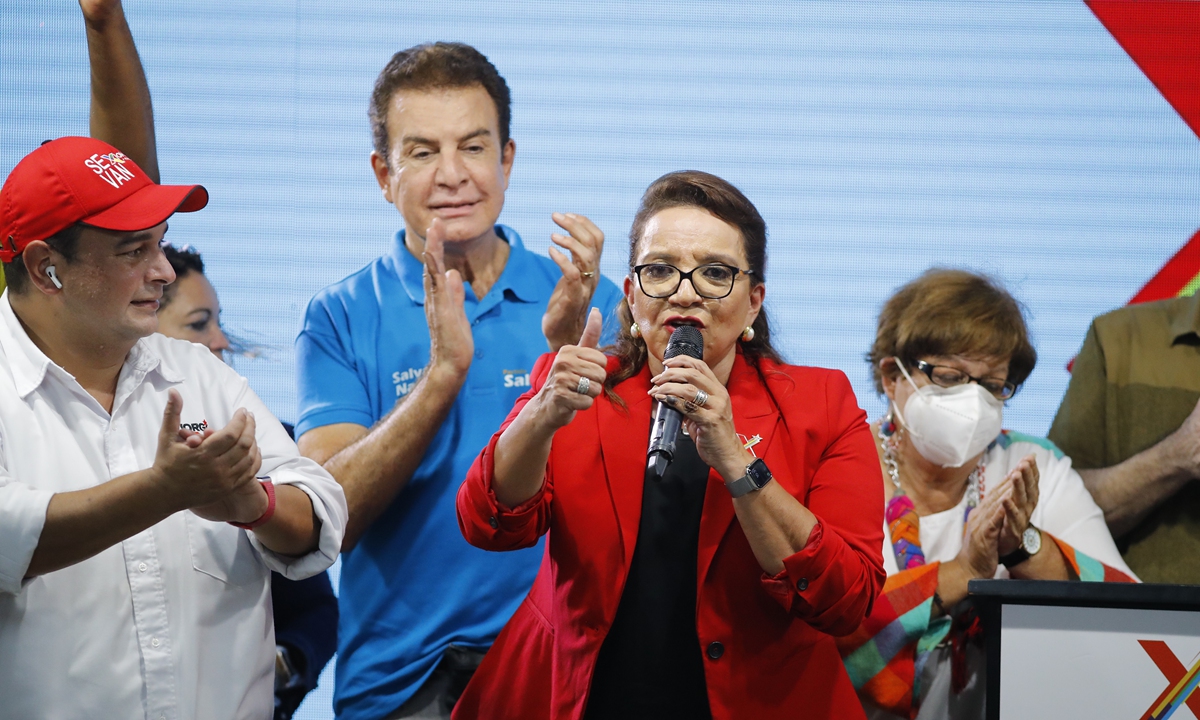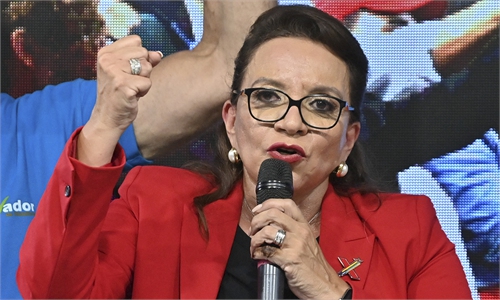
Presidential candidate Xiomara Castro (Red) speaks after hearing the partial results of the elections, in Tegucigaloa, Honduras, 28 November 2021. Photo: thepaper.cn
Preliminary results of the Honduran presidential election show that the left party opposition candidate Xiomara Castro has a large lead over her contenders.In two years of Latin American politics; Argentina, Bolivia and Peru impressively mark the return of left-wing forces and the pause of the "conservative wave." The pendulum swing within the region is in full effect.
The 2021 victor of the Peruvian general election, Pedro Castillo, solidified the return of left-wing influence. As the people began to lose confidence in the right-wing policies within the region, Castillo was able to win the election against Keiko Fujimori, a strong opponent from a right-wing party. Since the Peruvian left-leaning lower and middle classes make up the bulk of the society, it's clear that Castillo could be next in the office.
The impressive results of Chilean left-leaning candidates from the 2021 Chilean Constitutional Convention election marks a new phase in politics. Left and independent candidates took more than half of the seats in the election. Some of them were even elected as major regional governors by large margins.
The return of the left-wing forces in Brazil, the region's leading country, pushed the return of left-wing forces to the climax in Latin America. Brazilian people no longer trust the right-wing president Jair Bolsonaro, who has failed to stabilize the economy or control the COVID-19 epidemic. In contrast, left-wing leader and former president Luiz Inácio Lula da Silva has won tremendous support from the people, making him the most promising presidential candidate of 2022.
As the political pendulum swings, parties on both the left and the right are taking their turn at power. In the past few years, right-wing forces have had a strong power in Latin America but that reign never lasted long. Left-wing groups in some countries took advantage of presidential, legislative and local elections after strategic adjustment which led to their return.
This political phenomenon reveals that neither party will defeat their opponent once and for all because propositions of both parties are legitimate in Latin America. The right relies on the market and competition to boost the economy while the left prioritizes the lower and middle classes. The failure of the ideas from either party lies within the results of the people's vote.
Due to geopolitical, economic and historical-cultural factors, Latin America has always been an important part of the US foreign policy agenda; with immigration, drugs and the containment of the left being the main concern of US administrations.
There are reportedly several "Biden characteristics" in Latin American policies under the Monroe Doctrine. First, both engagement and containment are used to suppress the left. Biden tends to adopt "color revolutions" to support dissidents in Cuba, Venezuela, Nicaragua and other radical left-wing countries to change the regime.
Second, realism is back and investment in the Latin America has increased. To counter the China-initiated Belt and Road Initiative, Biden promised to prioritize the implementation of the US' Build Back Better World Initiative in Latin America, with a particular emphasis on Columbia.
Third, the democratic value system is emphasized to maintain the so-called irreplaceable and unique ties between the US and Latin America, in response to the growing influence from China and Russia. The US Secretary of State Anthony Blinken had been speaking about democracy during his visit to Latin American countries, reminding them of preventing China and Russia from undermining the democratic process in this region.
Fourth, in view of Mexican President Andrés Manuel López's condemnation of the Merida Initiative for being a tool of the US to interfere in Mexican domestic affairs and control its government Washington finally conceded and signed the US-Mexico Bicentennial Framework for Security, Public Health, and Safe Communities as the new security cooperation mechanism.
Despite the "Biden characteristics" of US-Latin America relations, the US won't allow any outside force to touch its backyard and threaten its security interests. The primary goal of the US is to have Latin American countries rally in forming a strategic barrier. The struggle between autonomy, dependence, control and anti-control in US-Latin American relations remains unchanged.
The author is director of the institute of developing countries at the China Institute of International Studies in Beijing. opinion@globaltimes.com.cn

